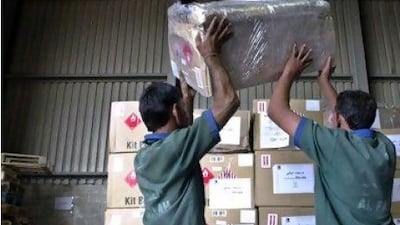Fees imposed by the government of Iraq on foreign air cargo operators are so high they restrict the flow of essential goods into the country, hindering the nation's long-awaited economic recovery, say cargo companies and aviation authorities.
Operators seeking permission to fly cargo into the country say the government directs them to give their business to Iraqi Airways and RUS Aviation, a small company based in Sharjah, or pay fees ranging from US$20,000 (Dh73,456) to $100,000 a flight to fly directly.
Such fees are many times higher than those charged by any other country in the region. For many companies they make flights economically unfeasible.
"The justification for taking these charges and fees is not clear," said Saif al Suwaidi, the director general of the UAE's General Civil Aviation Authority, which has asked Iraq to clarify the situation.
Some 40 per cent of the value of world trade is carried in the form of air cargo.
In Iraq, which suffers from poor road and sea connections, air cargo has played a crucial role in bringing in oil and gas equipment, foodstuffs, electronics and humanitarian aid to help drive the country's recovery.
Saleh al Aroud, the chairman of RUS Aviation, defended the fees, saying RUS was obliged to invest heavily in rebuilding Iraq's aviation infrastructure as part of an exclusive arrangement with Iraqi Airways.
RUS, based in the free zone at Sharjah International Airport, describes itself as a long-term partner to the Iraqi government. Due to the status of the UAE as a global transport centre, air cargo companies in the country have played important roles in rebuilding Iraq and the estimated $10 billion bilateral trade between Iraq and the Emirates.
RUS was the first cargo firm to operate in Iraq after the Second Gulf War. It flew almost 200 flights in two weeks to carry electoral materials for the first elections in 2005, and has been a service provider to the UN and the US government.
In exchange for its exclusive relationship with Iraqi Airways, which effectively gives it control over the broader cargo market, RUS said it agreed to provide services, equipment and even aircraft to its partner, valued at a total of more than $15 million.
This includes cargo handling equipment and machinery, paying for an estimated $10m aircraft landing system at Baghdad International Airport, financing the hire of outside consultants for the Iraqi carrier, providing extensive training, IT and management support, and handing over two cargo aircraft to Iraqi Airways.
The four-year contract began in 2009, and RUS has yet to deliver the landing system and the two aircraft, Mr al Aroud said.
At the time of the contract negotiations, "they were adding more and more conditions", he said. RUS officials now say they are unsure whether the risks they assumed in agreeing to the contract were worth taking.
The Iraqi government has earmarked $50bn to refurbish nine of the country's 14 airports, while another $28bn in investment is planned to build six airports.

